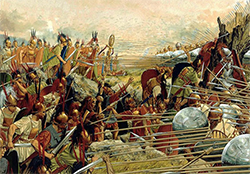Philip V of Macedon and the Struggles against Rome
Philip V was king of Macedon and fought various wars against the Greeks and the Romans. 
He was the fifth of his name to rule the area known as Macedon or Macedonia in ancient times. The first ruled in the 6th Century B.C. The second and most famous Philip ruled in the mid-3rd Century B.C. and gave birth to both Alexander the Great and Philip III, known as Arrhidaeus. A fourth King Philip had a brief reign in 297 B.C. Philip V was born in 238 B.C. His father, Demetrius II, died when the boy was 9 and his cousin Antigonus Doson served as regent until young Philip came of age, in 221 B.C. The newly created king in his own right set about expanding his land's borders. He also led the Hellenic League, consisting of a handful of Greek city-states, in the Social War, against another handful of Greek city-states. When that war ended, in 217 B.C., Philip sought to take advantage of the conflict between Carthage and Rome by offering his services to varying parties along the Adriatic coast. Significantly, Philip also cemented an alliance with the Carthaginian commander Hannibal in 215 B.C. 
The following year, Macedon launched an invasion of Illyria, echoing actions he had taken a few years earlier. The Romans, acting quickly and decisively, surprised Philip's army and sent it back to Macedon. Philip himself made it home, but his decision to burn his ships ended up stranding a large number of his soldiers, who were taken by Rome and either captured or killed. The struggle with Rome continued, even as Roman armies kept on falling in defeat to those of Hannibal. Roman actions in the east encouraged several Greek lands to oppose Philip. After a series of struggles and an aborted peace attempt, Philip found himself having a brush with death. In an attack on the city of Elis, he was thrown from his horse and survived by fighting on foot and leading his men to victory. In a subsequent attack, he routed his main opponent, Attalus, who fled. Gaining the upper hand, Philip carried on his attacks and seized a handful of other towns. Eventually, Rome sued for peace, and a treaty in 205 B.C. ended the First Macedonian War. The second war between Macedon and Rome was shorter in duration but more consequential in outcome. Rome defeated Carthage in the Second Punic War, which ended in 202 B.C. Two years later, Rome declared war on Macedon. Philip, meanwhile, had been focused on the east, campaigning in Egypt and in the Dardanelles. He returned to Macedon about the time that a Roman force headed that way. By this time much improved in battle, the Romans had success after success against Philip. Rome fashioned multiple avenues of attack, with the consul Sulpicius invading northern Macedonia in 200 B.C. and then another consul, Flaminius, invading Thessaly two years later. As well, Roman ships allied with an Athenian fleet for naval actions. 
Another peace attempt resulted in nothing, and the two sides continued the fighting. Flaminius proved the better of Philip, Roman legions again besting Greek phalanxes. Building in experience and allies, the Roman army confronted the Macedonian force in Thessaly in 197, in the epic Battle of Cynoscephalae. Employed by Flaminius on the Roman side were 25,500 men and 20 war elephants; Philip countered with a force of 26,000. In a muddy, messy affair, Flaminius led his troops to a convincing victory, sending the Macedonians fleeing from the battlefield. Philip's casualties numbered in the thousands; Roman casualties numbered in the hundreds. A peace agreement followed, and Philip paid a heavy prices–in both money and prestige–for opposing Rome. In addition, Philip agreed to send some of his own troops to aid Roman war efforts. Philip also enjoyed the nominal alliance with Rome by attacking a handful of city-states in central Greece. When Philip V died, in 179 B.C., his son Perseus set about trying to solidify his hold on power. An alliance with the Boeotian League gave him breathing room, but he eventually fell afoul of Rome, triggering yet another war with the powerful Italian republic. Roman forces defeated Macedonian forces at the Battle of Pydna in 168 B.C.. This was the end of the Macedonian monarchy, the victorious Romans abolishing it the following year and setting up a number of republics in its place. When Rome defeated Carthage for the third and final time, in 146 B.C., Macedon finally and fully became a Roman province. |
|




